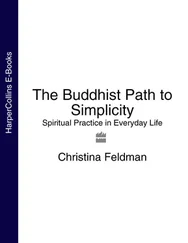1 ...7 8 9 11 12 13 ...17 The word sin has a literal translation of “off the mark.” In this sense, behavior that religion has taught us is sinful is conduct that is off-the-mark or away from God. This, according to Patanjali, is not a reason to immerse ourselves in guilt and use up life energy attempting to somehow make amends. Rather it should be viewed in the context of an obstacle that we have yet to overcome.
When addressing “sinful” behaviors as obstacles we begin to see what it is we must do to access the spiritual solution we seek. When viewed as sin, we place the responsibility for correcting the conduct on a God who is external to us. Thus we hope that this external God will forgive, and we find ourselves laden with guilt and anxiety over whether we deserve to be problem-free. I like these powerful words of Mahatma Gandhi on how to deal with our shortcomings: “My imperfections and failures are as much a blessing from God as my successes and my talents, and I lay them both at his feet.”
Viewing a failure as an invitation to recourse with God is a much more useful way of handling the “problem.” Wallowing in shame, feeling as though we have sinned and are not deserving of forgiveness is not the best way to find solutions! Try this inner dialogue instead: “I have not sinned against God. I have behaved in such a way as to inhibit my complete union with God. These behaviors are obstacles to my finding a spiritual solution. Beginning right now I will work at removing these obstacles from my life.”
The concept of being a sinner is an image of self-contempt and guilt, while the concept of encountering an obstacle is empowering. I love the healing parable of Jesus and the blind man.
As he went along he saw a man blind from birth, his disciples asked him, “Rabbi, who sinned? This man or his parents, that he was born blind?”
“Neither this man nor his parents sinned,” said Jesus, “but this happened so that the work of God might be displayed in his life.”
We have been trained to think in terms of sin and punishment. These ideas disempower us by stressing that we are weak and wrong. The empowering way is to view trials as lessons and opportunities to choose differently. We can transcend the odious notion of being sinners cloaked in guilt, awaiting punishment. To access a spiritual solution to a problem involves focusing on the idea of a solution. The sinner filled with guilt becomes immobilized and remains in passive inertia. When we view the sinful behavior as an obstacle to a higher level of awareness, we can still take responsibility by asking ourselves, “What is the lesson for me? And what can I do to avoid this the next time?”
The disciples in the parable assumed that the man’s blindness must have been caused by a sin somewhere by someone involved in this blind man’s life. But Jesus taught that misfortunes in the physical world are not because humans have sinned. The misfortunes are obstacles on the path to uniting with the infinite within us. He reminds them that no sin has taken place.
We are all blind in many ways. It is through our figurative blindness that God’s work can be displayed in our life. It was Mahatma Gandhi among others who preached the value of the dark side. Our dark side and our dark spots are as Gandhi said, a blessing from God, rather than an encumbrance for which we are to be punished. Our conditioned belief system learned the concept of sin.
This “radical” idea teaches the concept of obstacles to unified awareness of God within. If you have violated any of the commandments that you ideally hold on to as law; if you have stolen, cheated, or lied, or coveted or even physically harmed another, try viewing these actions as obstacles to your spiritual union with all that you truly are and can become. Remind yourself that this is what you would love more than anything. Then you will have empowered yourself to begin the process of removing those obstacles.
This is such a freeing concept. Say to yourself, “I still have obstacles that I have imposed which keep me from a spiritual solution,” rather than, “I am a sinner and there is no hope for me unless God sees it in his heart to forgive me.” One thought empowers, while the other diminishes. One thought leads to a solution, the other keeps you immobile. In short, go and sin no more, because there is no such thing.
Even if you have done irreparable wrong to someone through uncontrolled greed, or anger, you can still view this action in terms of obstacles to your union with God. Certainly you will feel remorse and do all that you can to right the wrongful acts. You can only correct such flaws in the future by viewing yourself as having erected barriers to your highest self and by forgiving yourself. Sincere penance does not consist of perpetuating grief for wrongs but in resolving to avoid in the future those deeds that call for remorse.
The person who is steadfast in abstaining from falsehood has the power to obtain for himself and others the fruits of good deeds, without having to perform the deeds themselves.
Normally when we use the word truthful we infer that a person’s words correspond to the facts of which he speaks. Yet in this yoga sutra, Patanjali’s phrase, “steadfast in abstaining from falsehood,” means something quite apart from being factual and honest.
What is meant here is the practice of completely and wholly identifying oneself as a spiritual being, united with God at all times and never confusing one’s identity with the ego world of possessions, achievements, and reputation. To reach this state is to be in the company of those rare saints whom we all revere and quote so frequently. In this state we can be moving toward steadfast abstention and find ourselves gaining those fruits of good deeds. They will enable us to not only resolve our own “problems” but those of others.
Look carefully at the words used in this sutra. Obtaining for yourself and others the fruits of good deeds without having to perform the deeds . Just what does this mean to you?
Patanjali suggests that steadfast abstention from falsehood means that saying to someone, “God bless you,” means that the person is truly blessed because we are no longer capable of even dreaming an untruth. Similarly, this steadfast abstainer from falsehood can perform miraculous cures by simply telling a sick person that he is well. Thus Patanjali suggests that when a person becomes perfected in truth he literally gains control of truth. That person’s being, along with their words and actions allows them to obtain the fruits of good deeds without necessarily performing the deeds with their physical bodies.
Now I am not offering you sainthood here in exchange for becoming a one-hundred-percent truth teller. Rather, what I am proposing is that you open yourself to an idea that allows you to gradually and steadily remember your identity as a divine spiritual connected-to-God entity. In moments you previously labeled as stressful or problematic, you will begin to see the fruits of good deeds (another way of saying problem solving) show up without having to labor long and hard to solve your difficulty.
The very fact of your self-reminder that you are united with God in this very instant of strife will allow your thoughts and affirmations to become your reality. As you steadily gain this awareness, you will have the same impact on others. In other words, you will be bringing spirit (which is all you are in your awareness) to everyone and everything you encounter, and the fruits of good deeds will be observed on a regular basis. Whenever you find yourself filled with inner frustration or rage, a gentle private reminder to abstain from this false identity with the material world, will bring you back to your true essence. When you are back, notice how the rage and frustration have dissipated. Now use words to bless yourself and the situation, and you begin to see what Patanjali meant with this “radical” aphorism.
Читать дальше












